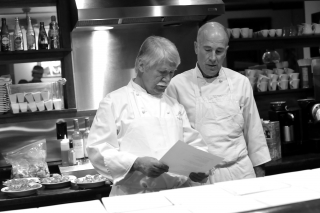
Think Different: Evolving College Education
02 April 2024Challenging culinary education norms to create an exceptional 21st-century model.
By Paul Sorgule, MS, AAC
Feedback & comments: This email address is being protected from spambots. You need JavaScript enabled to view it.
Apple proclaimed “Think Different” to be their mantra. It is the basis for their company’s existence and the driving reason why customers become raving fans. Although grammatically incorrect, it is a clear statement of existence and a strong proclamation they are ready to evolve as the world around them does the same. In fact, in some cases, they have driven change around them as a leader in something new, unexpected and exciting.
The marketplace – and the world around us - has changed exponentially over the past few decades. In fact, 52% of the Fortune 500 companies of just 20 years ago are no longer around. Those who were focused and prepared to reinvent have been able to weather the storm. Those who weren’t are barely remembered.
Everything changes, it is a fact of life; everything except maybe education. Sure, we have added technology and the experience of going to college has become more accommodating of peoples’ lifestyles. We have even added majors. However, the basic premise of what, why, how, where, and when we deliver that education has changed very little. A teacher or student from 1980 would find the transition to today’s college classroom quite easy.
Culinary education is wrapped up in the same state of paralysis, somewhat content to succumb to the accepted model and the parameters defined by state, federal, other outside licensing bodies, and accrediting agencies. We are told how to award credit, what the composition of a degree must be, and under what conditions we can award a credential. Furthermore, college administrations have too often remained unwilling to move the needle to a different spot on the dial and push for any type of dramatic change. Ah, but the marketplace and consumers of education HAVE changed, and they scratch their heads waiting for higher education to respond.
The first question to consider asking is “Why?” Why are we in the business of education? Why do we offer programs in culinary arts? Why might potential students and the industry that hires graduates want to choose us? It is the why that sets the foundational cornerstone for everything else. The why leads to “how” we will respond to the why and eventually “what” specifically will we offer to lead all stakeholders our way.
It is time to – as Apple’s mantra states - “Think Different.” Each school must challenge the norms and develop products and services that define its niche and the specific students they hope to attract. We forcibly learned to adapt to Covid’s challenges. It was out of necessity that schools investigated alternative delivery methods and created new products that kept heads above water. Congratulations, you did it!
Let’s now choose to become more proactive. Let’s talk to students to understand their needs. Let’s engage industry employers in the conversation. Let’s assess the competition and find a unique and different way. And, by all means, let’s educate the administration on the need for and excitement that surrounds change.
Consistency is an understandably comfortable goal, but it rarely excites the stakeholders involved. Education should be relevant, engaging, eye-opening, challenging, and exciting as well. Let’s consider questioning the way it has always been and enter a new paradigm shift in learning.
Let’s not lament that students are not what they were in the past. We have a new generation of students in our classrooms. Let’s seek to discover how they want to learn, what are the appropriate methods of reaching them, and how can we create a more contemporary learning environment. Instead of attempting to tell the industry we serve what students should know, let’s have a real conversation and discover how the environment of work has changed and what skills fit the bill. Rather than simply accept those parameters of the existing educational model that have been normalized by government agencies, outside accreditors, and college administrations – let’s build a case for change with hard data and validated qualitative research. Change is best served as a grassroots initiative. Bring the energy, passion and opportunity that change provides and think and act different. Why not start the conversation?
PLAN BETTER – TRAIN HARDER – EMBRACE THE OPPORTUNITY
Paul Sorgule, MS, AAC, president of Harvest America Ventures, a mobile restaurant incubator based in Saranac Lake, N.Y., is the former vice president of New England Culinary Institute and a former dean at Paul Smith’s College. Contact him at This email address is being protected from spambots. You need JavaScript enabled to view it..
